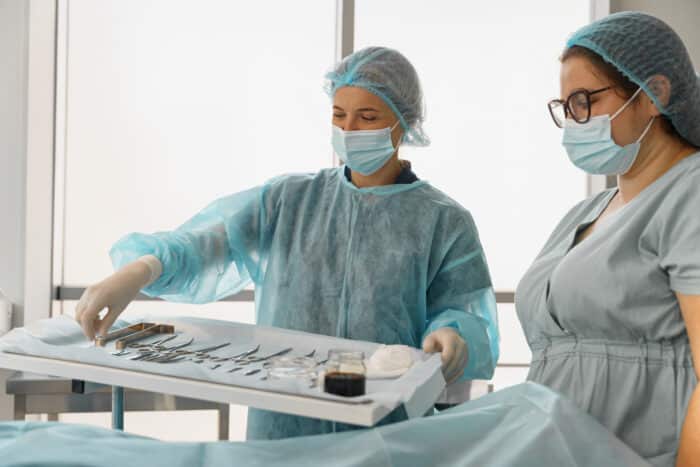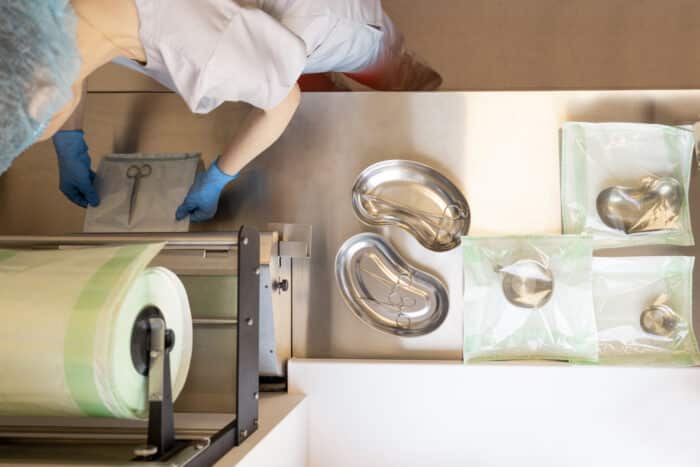Are you interested in a career in healthcare but need help deciding where to begin?
Are you passionate about helping people?
If you answered yes to these questions, pursuing a career as a sterile processing technician might be a good path for you.
But what is a sterile processing tech? A sterile processing technician is a healthcare professional responsible for cleaning, sterilizing, and preparing medical instruments and equipment for safe use in surgeries and other medical procedures.
The beauty of pursuing this rewarding career is that a degree isn’t necessary. All that’s required is a high school diploma or GED.
In this article, we aim to address questions such as what these technicians do and more, so you can decide if this is the right career for you.
We will also dive into salary insights, duties, and how to become a sterile processing technician.
Let’s get started!
What is a Sterile Processing Technician?
A sterile processing technician or central sterile processing and distribution technician is a healthcare professional responsible for cleaning, sterilizing, and readying medical instruments and equipment.
Their duties involve maintaining cleanliness standards, preventing infections, and safeguarding the well-being of both patients and healthcare personnel.
What Do Sterile Processing Technicians Do?
Now, to answer the most important question, what exactly do sterile processing technicians do?
Let us take a look:
- Cleaning and Decontamination: Technicians clean and decontaminate medical instruments, ensuring they are free from biological matter and other impurities before the sterilization process.
- Sterilization: Using specialized equipment like autoclaves, these technicians also sterilize instruments, ensuring they are safe for use in medical procedures. This process involves high-pressure steam, gas, or other sterilization methods to kill bacteria, viruses, and other pathogens.
- Equipment Maintenance: SPTs maintain and inspect sterilization equipment, ensuring it functions properly. They perform routine tests and checks to validate the effectiveness of the sterilization process.
- Inventory Management: They manage inventory, keeping track of supplies and ensuring the availability of sterile instruments and equipment needed for medical procedures.
- Adhering to Protocols: Following strict protocols and guidelines is also an important role for SPTs. They must comply with industry standards and regulations to ensure the safety and sterility of medical instruments.
- Collaboration: Technicians work closely with healthcare professionals, including surgeons, nurses, and operating room staff, to provide sterile instruments and equipment necessary for medical procedures.
Read More: What Does a Sterile Processing Technician Do?
Sterile Processing Technician Salary
As per the U.S. Bureau of Labor Statistics (BLS), phlebotomists typically earn an average annual salary of $44,940, equivalent to $21.61 per hour.
However, it’s essential to note that these salary numbers can vary based on several factors like experience, the type of workplace, job location, and more.
Sterile Processing Technician Career Outlook
The career outlook for sterile processing technicians, according to the U.S. Bureau of Labor Statistics (BLS), is significantly positive. The demand for these technicians is projected to grow at a faster-than-average rate compared to other occupations.
The BLS projected employment growth of about 8.3% from 2020 to 2030 for medical equipment preparers, which includes sterile processing technicians. This means that there are about 7,900 new job openings for aspirants in this field.
This growth can be linked to the increasing demand for healthcare services due to an aging population and advancements in medical technology, which require more complex instruments that need proper sterilization and handling.
See: Best Online Sterile Processing Course
Where Do Sterile Processing Technicians Work?
Sterile processing technicians work in various healthcare settings where medical instruments and equipment are used.
Some of the primary places where you’ll find these technicians include:
- Hospitals: They are a core part of hospital teams, ensuring that surgical instruments and other medical tools are properly cleaned, sterilized, and ready for use in surgeries and treatments.
- Surgical Centers/Clinics: Ambulatory surgical centers and specialized clinics also employ sterile processing technicians to maintain the cleanliness and sterility of instruments used in minor surgeries and procedures.
- Outpatient Care Centers: These technicians might work in outpatient care facilities where medical procedures are performed without overnight stays, ensuring the sterility of instruments used in various treatments.
- Dental Offices: Some sterile processing technicians might work in dental offices, where they handle the cleaning and sterilization of dental instruments.
- Long-Term Care Facilities: In places like nursing homes or long-term care facilities, these technicians ensure that reusable medical equipment is properly cleaned and sterilized.
- Laboratories: Laboratories, especially those handling medical testing, might also have sterile processing technicians to manage and sterilize lab equipment.
Read More: Certified Sterile Processing Technician
How to Become a Sterile Processing Technician?
Now that you’ve learned all about sterile processing technicians, you might be curious about the steps to become one.
We’re here to walk you through the process with a step-by-step guide:
High School Diploma or GED:
Start by completing your high school education or obtaining a GED. This is usually the minimum requirement to begin your journey towards becoming a sterile processing technician.
Enroll in Sterile Processing Training:
Choose a suitable training program specific to sterile processing. These programs teach you the necessary skills, such as handling and sterilizing medical instruments, ensuring cleanliness, and maintaining safety standards.
Practical Experience:
Gain hands-on experience through internships or externships. Practical exposure in a real healthcare environment is crucial to apply what you’ve learned in your training.
Certification:
While only important in some places, obtaining certification can boost your job prospects. It showcases your competency in handling sterile instruments and following proper protocols.
The most common and accessible certification available for budding sterile processing technicians is the Certified Registered Central Service Technician (CRCST) certification. It’s a certification offered by the Certification Board for Sterile Processing and Distribution (CBSPD) that validates an individual’s knowledge and skills in sterile processing, ensuring they meet specific standards in handling and sterilizing medical instruments and equipment.
Read: Sterile Processing Technician Certification
Job Application:
Once certified, you can start applying for positions as a sterile processing technician.
Conclusion
In conclusion, sterile processing technicians play a vital role in healthcare by ensuring instruments are clean and safe for medical procedures. We hope this article provided insights into their responsibilities, training, and how to pursue this career path.
See: How to Become a Sterile Processing Technician
Related Resources:
- Sterile Processing Technician Salary
- Sterile Processing Technician Requirements
- Sterile Processing Technician Resume
- Sterile Processing Technician vs. Surgical Technologist
- Sterile Processing Technician School
- Sterile Processing Technician Course
- Sterile Processing Technician Training Program Cost
- CRCST Certification
Related Articles
-
How to Be Successful in College in 2022 – 7 Simple Tips to Succeed
-
How Do Scholarships Work? Read This First…Truth is Shocking
-
7 Best College Majors 2024: What Should I Major In?
-
How to Choose a College – 10 Things You Must Consider in 2024
-
Why Go to College? Top 13 Benefits for Adult Students in 2022
-
Top 5 Best Alternatives to Community College for 2024







